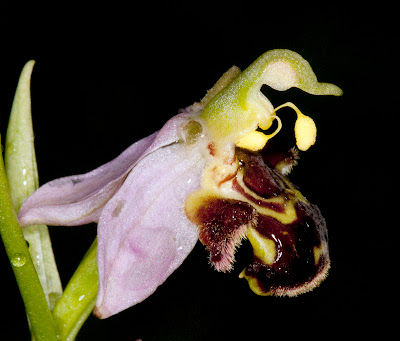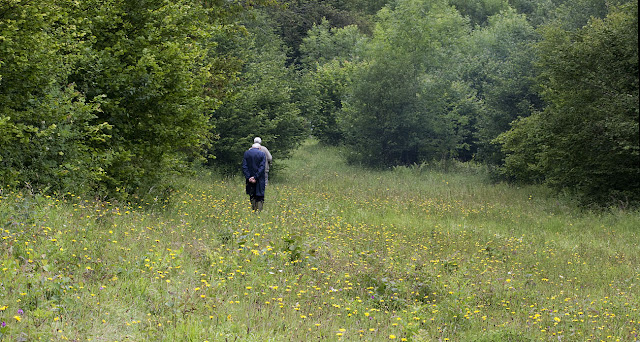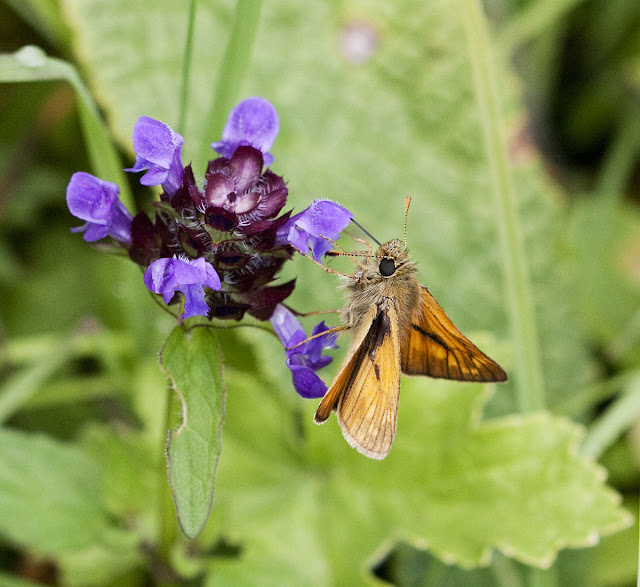 |
| Horse and foal near Downe. 25 June 2011. |
Downe Bank is in the middle of a beautiful area of countryside between Downe and Cudham, on the bank of Cudham Valley. It's a nature reserve and a Site of Special Scientific Interest, and part of it is open to the public. We walked down to Orchis Bank and over the next couple of hours moved slowly along and back.
The walk was planned to look at the flora, but I always photograph any invertebrates and any other things of interest that will hold still long enough. This horse and foal were in a field on the path from Downe.
 |
| Bee orchid, Ophrys apifera, on Orchis Bank, showing pollinia. 25 June 2011. |
We went into the area labelled as Orchis Bank, Darwin's name for one of the areas he studied. Naturally, there was a focus on orchids, and even though the weather this year has not encouraged them, there were plenty of common spotted orchids and common twayblades, with pyramidals scattered among them. Several bee orchids were spotted, and later on, some fragrant orchids. But these showy specimens were only the tip of a wealth of plant life.
I was interested to see a lush black bryony, climbing an ash sapling, which had a shoot with dark purple leaves. I wonder if that is a somatic variation or a true reproducible variety. Other shoots of the same plant looked quite normal.
As usual, the group spread out and straggled. I was often at the back, taking photographs. I saw a few Helix pomatia, the large edible snails that were introduced by the Romans. They were sheltering in small hollows which seemed to be just their size. They did not seem to want to emerge from their shells.
 |
| Weevil, Apoderus coryli, on my hand, on Orchis Bank. 25 June 2011. |
The open area was full of yellow flowers, one of the many local species that resemble dandelions. It is interesting that all the local meadows seem to have one of these species predominent. Often it's cat's-ear, but in this case it was the rough hawkbit, Leontodon hispidus. There were also many specimens of hairy St. John's wort, which added to the general yellowness. Marmalade hoverflies were everywhere, often sitting on the yellow flowers and letting me get close up with the camera.
The line of people wound along the narrow path, singly and in groups, turned round at the end and moved back lower down the hill. A few returned the way they came, and others went on and back a different way. I went along to the track on the lower path and climbed the gate into Musk Orchid Bank, which I had visited once before on Ewa Prokop's primrose walk.
Back in March, the grass was short and primroses stood up above it. Now all the plants stood tall. I saw several marbled white butterflies flitting about, but I didn't want to chase them until they settled because it would have meant trampling down all the plant life. The one I came across that was already settled had lost a piece from both hind wings; perhaps it had a close encounter with a bird and was lucky to get away.
I was following the hint of a track that might have been made by a fox, or by one person going unseen ahead of me. There were a few large skippers and I also saw one large field scabious, its light blue flowers standing above all the rest.
 |
| Wandering along Orchis Bank. The yellow flowers are mostly rough hawkbit, Leontodon hispidus. 25 June 2011. |
 |
| Ringlet butterfly, Aphantopus hyperantus, basking on Orchis Bank. 25 June 2011. |
 |
| Marmalade hoverfly, Episyrphus balteatus, on hairy St. John's wort, Hypericum hirsutum, on Orchis Bank. 25 June 2011. |
 |
| Fragrant orchid, Gymnadenia conopsia, on Orchis Bank. 25 June 2011. |
 |
| Marbled white butterfly, Melanargia galathea, missing some pieces of wing, on Musk Orchid Bank. 25 June 2011. |
 |
| Florets of field scabious, Knautia arvensis, on Musk Orchid Bank. 25 June 2011. |
 |
| Large skipper, Ochlodes venatus, male, feeding on selfheal, Prunella vulgaris, on Musk Orchid Bank. 25 June 2011. |
All the photos in this post were taken with a Canon EOS 450D and an EF 100mm macro lens. For the closeups I used a ring flash.
If this was interesting, you might like to see Irene Palmer's web presentation on Downe Bank: Darwin's 'Entangled Bank' at Downe, A Warden's Tale.
Beautiful. You keep posting things I'd never have dreamt of seeing, and the EOS is performing beautifully for you. Is that colt a baby Shire?
ReplyDeleteAs for the presentation linked to, I wish folks would learn that print-over and music-over are both inherently and always offensive, ruinous. Modest spoken identifications alone are sometimes good, if modest enough. And if the photography isn't great, nothing will make it better.
As for "A Warden's Tale", I'd prefer to buy a nice, well printed, well photographed book, with NO text printed on images (!) or else have captions to a blog like yours--and no sloppy verse.